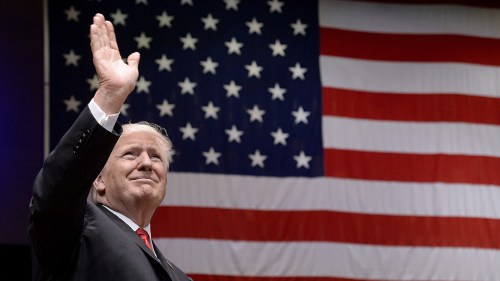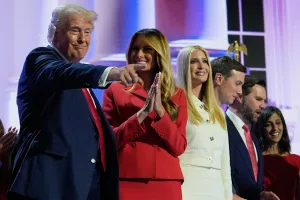GOP long shots face steep hurdles ahead of second debate
Lower-tier Republican presidential candidates are facing growing hurdles as they seek to qualify for the second primary debate.
Miami Mayor Francis Suarez on Tuesday became the first candidate to drop out of the primary after he failed to qualify for the first debate in Milwaukee, underscoring the challenges GOP presidential hopefuls already face in trying to break through in the crowded field.
Now other low-polling candidates like conservative radio host Larry Elder, who also did not qualify for the debate, and former Arkansas Gov. Asa Hutchinson, who made the debate stage but so far has failed to drum up much interest, will have to grapple with how to reach an even higher threshold to make the next debate stage in a race that has largely been overshadowed by former President Trump and a few other candidates.
“Some people run and they know they’re not going to win, but they’re trying to make a point,” said Republican strategist Brian Seitchik. “They’re trying to build a donor network for a future run. They’re trying to focus on a particular issue because they deem it important. And some people were just doing their own rendition of ‘Don Quixote,’ and this is the manifestation of that.”
In a sign of growing worries among Republicans who want an alternative to Trump, the editorial board for the National Review, an influential conservative magazine, called on Hutchinson to drop out of the race. The editorial, which was published a day before Suarez’s announcement, praised Hutchinson as a “fine public servant” who has accomplished much in his career but said he should help the non-Trump vote come together behind a more viable candidate.
“It’s not as though Hutchinson’s 1 percent support in the polls is going to provide a big boost to anyone else, but every bit counts and it will be good to establish the precedent of flagging candidates’ being willing to step aside for the greater good,” the editorial states.
Seitchik said the lower-tier candidates must weigh their campaigns’ “prospective end games” as they look to qualify for the next debate, which will take place in Simi Valley, Calif., on Sept. 27.
Aaron Kall, an expert on presidential debates and the director of debate at the University of Michigan, said the first debate gave candidates the best chance to get on the stage because the requirements for participation were as low as they will be, but the debate field will only be narrowed from there “by design.”
Candidates only needed to obtain 40,000 unique donors and reach 1 percent in three national polls, or two national polls and two polls in four early-voting states, to qualify for last week’s debate. But the Republican National Committee (RNC) is raising that threshold to 50,000 unique donors and 3 percent in two national polls, or in one national poll and two polls in four early states, to get on the stage for the second debate in September.
“They have time, but as of now, I didn’t see anything in the polling, just because by not being on that first stage, you’re deprived of any oxygen really … to get there,” Kall said.
The suspension of Suarez’s campaign comes relatively early in the race, only a few months after he first announced his bid in June. But recent elections with crowded primaries have seen candidates make the decision to drop out at similar points in the cycle.
In 2016, former Texas Gov. Rick Perry and then-Wisconsin Gov. Scott Walker, the latter of whom was initially seen as a possible top contender for the nomination, had dropped out by the middle of September.
Half a dozen Democrats dropped out by this point in the 2020 cycle, one that saw almost 30 major candidates run for the party’s nomination, more than in any other year.
With a dozen candidates in the current GOP primary field, failing to make the second debate could be a strong indicator of who is likely to step away next.
The top elected official in the first state to vote, Iowa Gov. Kim Reynolds (R), suggested earlier this month that the field should narrow. Reynolds has not endorsed any candidate and has drawn the ire of Trump.
Suarez himself put pressure on other poor-performing candidates weeks ago when he said that candidates should drop out if they do not qualify for the first debate.
Kall said that while it’s “technically possible” for candidates who didn’t make the first debate to qualify for the second one, it’s not likely. Other than Suarez, the notable candidates who did not make the first debate include Elder, former Rep. Will Hurd (R-Texas) and Michigan businessman Perry Johnson.
Carly Fiorina did not qualify for the first GOP primary debate in the 2016 race, instead having to participate in a separate debate held earlier that day for lower-tier candidates. But she was eventually able to qualify for several of the main debates later in the cycle.
“But the big difference was there were no warmup debate this time where a candidate could have a good performance and then get promoted to the main stage,” Kall said, comparing that election cycle to the 2024 primary. “So they didn’t have that opportunity to do so.”
Seitchik said long-shot candidates need to find a way to stay relevant in the political environment, noting that the Federal Election Commission (FEC) complaint from Elder over the RNC’s qualifications for the debate might be his “best effort to stay relevant.”
Elder alleged in the complaint that the RNC violated FEC regulations in not including a Rasmussen poll that he argued helped him qualify for the debate.
Democratic debate strategist Jason DeSanto, a senior lecturer at Northwestern’s Pritzker School of Law, said he expects other candidates to drop out a bit closer to voting getting underway in Iowa and New Hampshire. He noted the next FEC fundraising deadline at the end of September to be a “critical inflection point” for candidates to evaluate their standing.
DeSanto said the entire process with fundraising and the debates “feeds on itself,” meaning that posting strong fundraising numbers and making the debates will help candidates bring in more donations and make future debates.
But he said not making it can contribute to keeping candidates out of the race, arguing that candidates like Hutchinson and North Dakota Gov. Doug Burgum (R), who both made the first debate but have yet to qualify for the second, face the challenge of having to “jump up” to meet the higher threshold.
“One of the perils of getting into the first one is if you don’t get into the second one, now the perception of the articles are going to be about the fact that your campaign is sliding or rolling backwards,” DeSanto said.
“Even though that support may be relatively the same, if you haven’t grown it sufficiently, the final exam is, ‘Did you get up on the stage?’ And if you didn’t, you’re not viewed or written about as being a legitimate contender for the race,” he said.
Copyright 2024 Nexstar Media Inc. All rights reserved. This material may not be published, broadcast, rewritten, or redistributed..



















